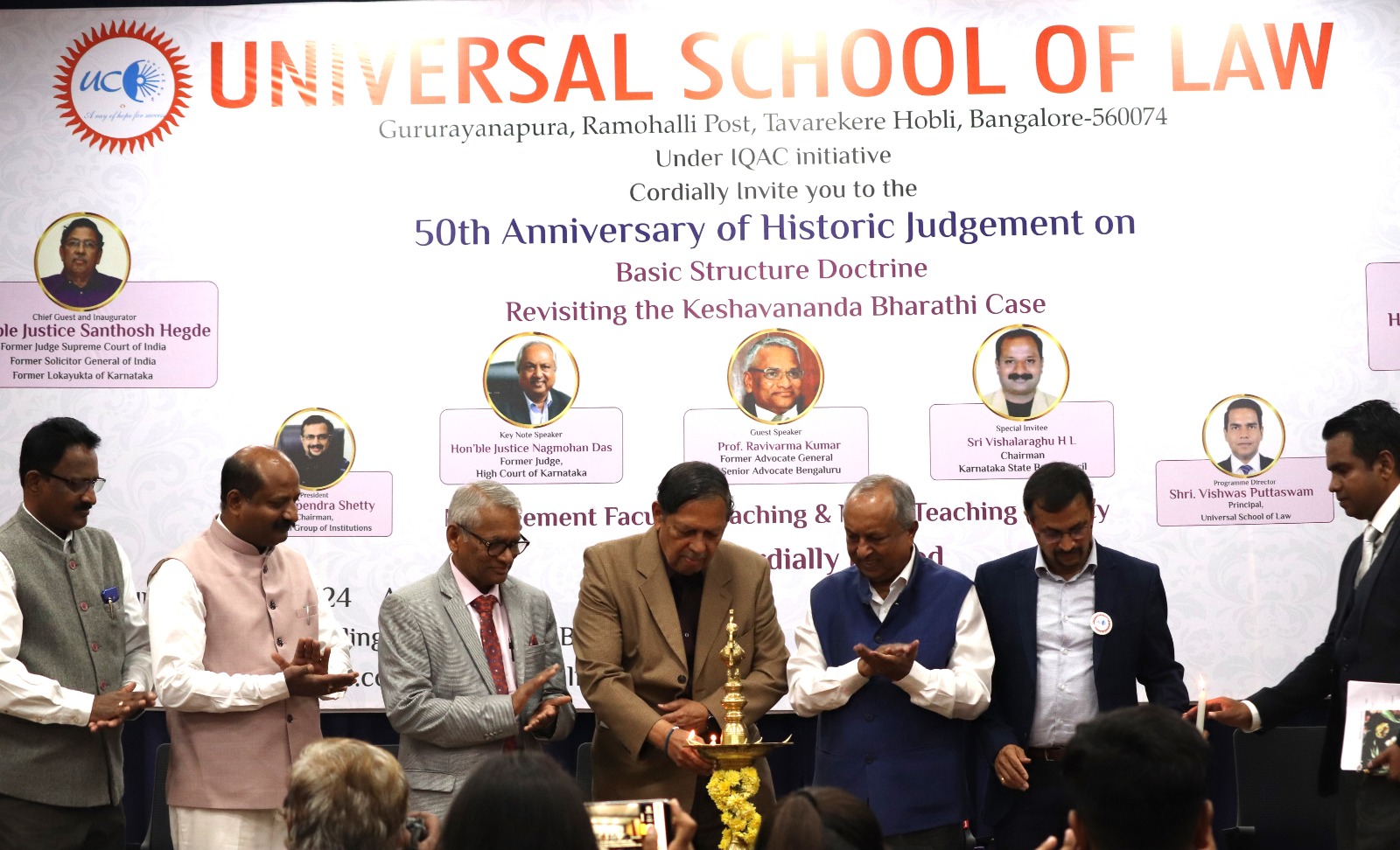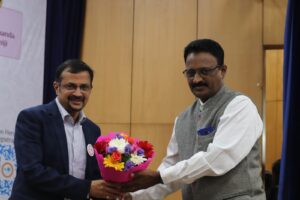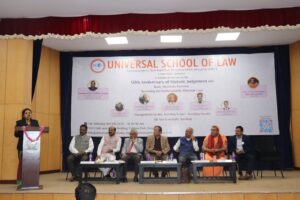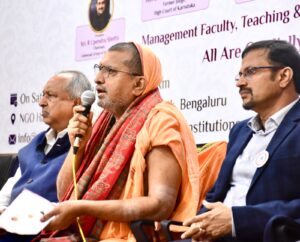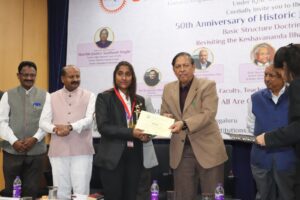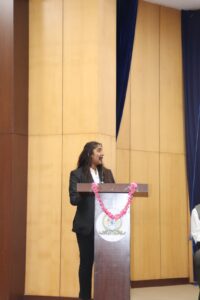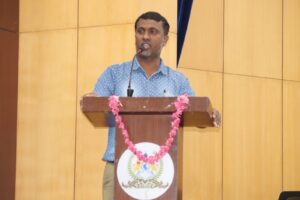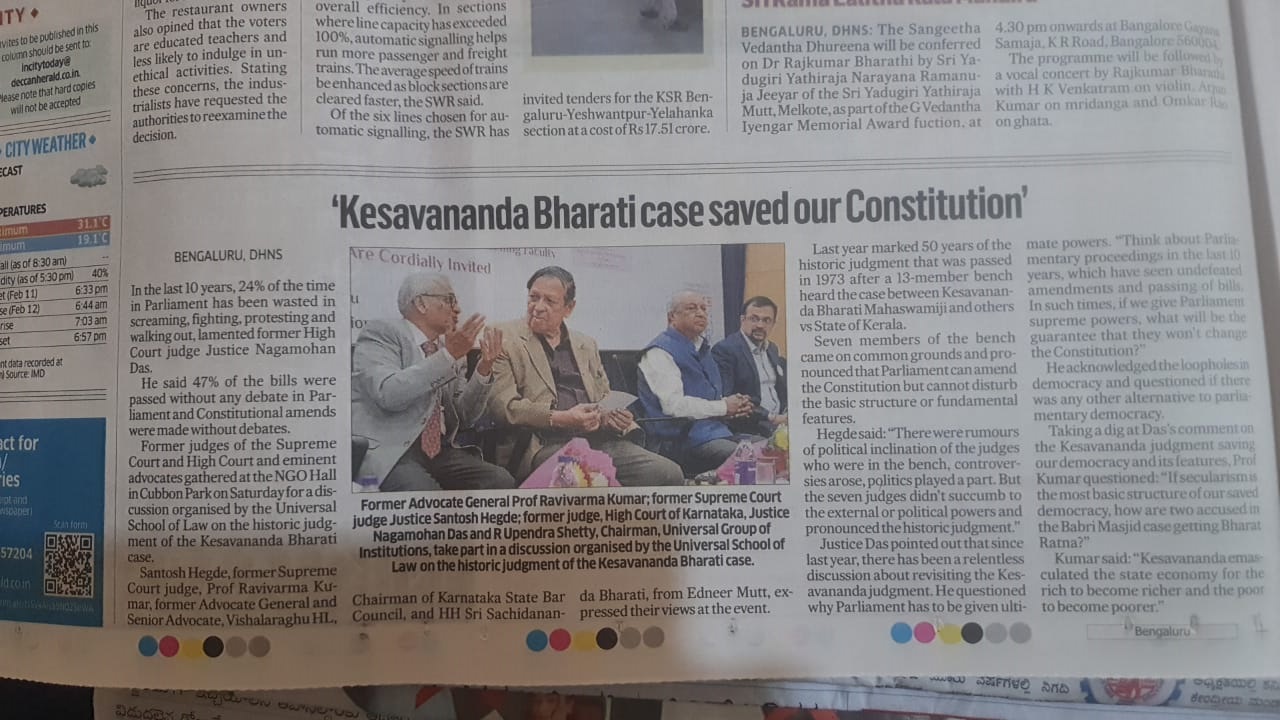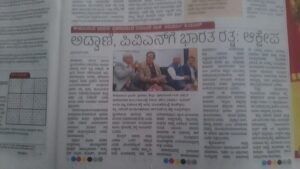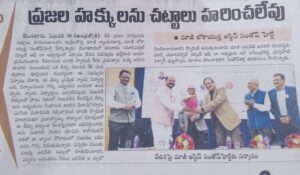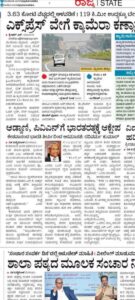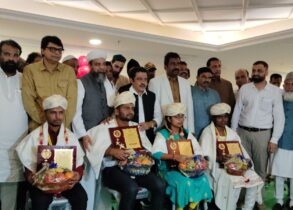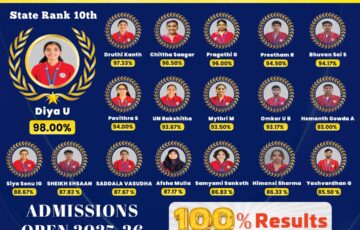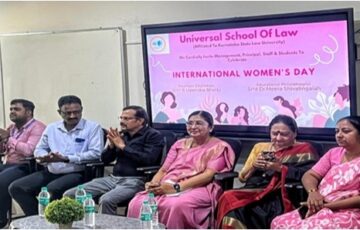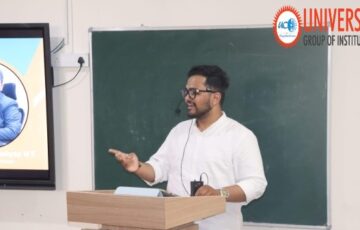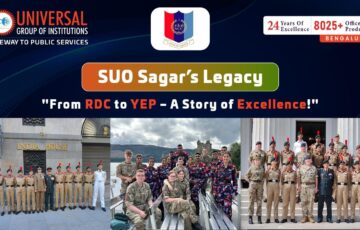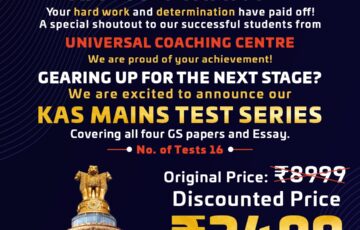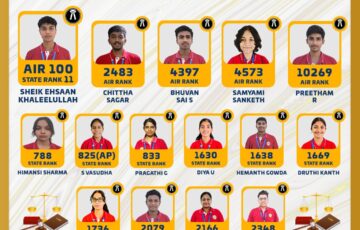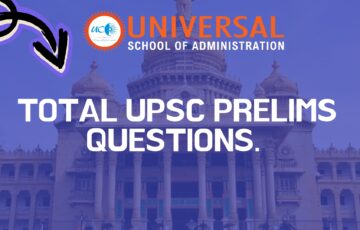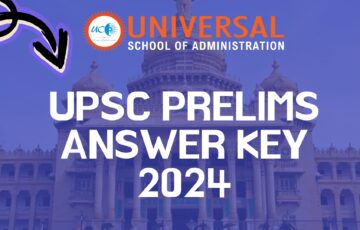Reflections on the Keshavananda Bharathi Case: Preserving Democracy Amidst Judicial Legacy
On February 10-2024, Universal School Of Law hosted a event to commemorate the 50th anniversary of the landmark Keshavananda Bharathi case. The case established the “basic structure doctrine,” which restricts Parliament’s power to amend the Constitution and protects its core principles. The event explored the case’s historical context, legal implications, and its enduring impact on Indian democracy.
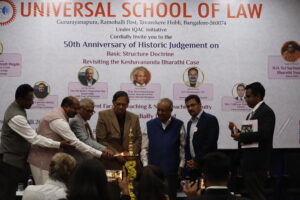
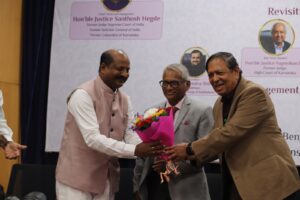
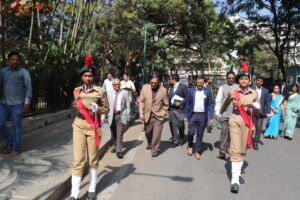
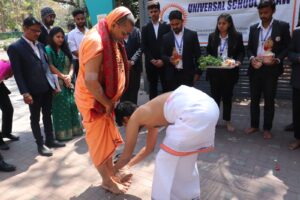
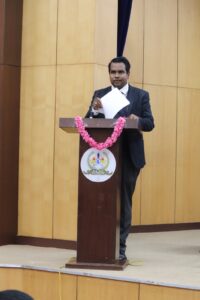
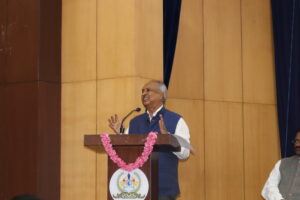
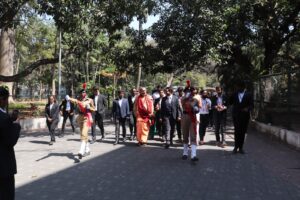
The Keshavananda Bharathi vs. State of Kerala case was heard by the Supreme Court for 68 days, delivered on April 24, 1973. The case involved the Kerala Land Reforms Act of 1963, which restricted the area of land ownership and allowed the government to take over land of big landowners for distribution to the landless people. Swami Keshavananda Bharathi challenged the constitutionality of the act, claiming that the right to property is a fundamental right and the government cannot take away his property.
The court had to form a 13-judge bench to hear the Keshavananda Bharathi case because an earlier case, Golaknath vs. State of Punjab, had stated that the fundamental rights of citizens cannot be taken away by way of constitutional amendments by the parliament. The supreme court held that parliament has the power to amend even the fundamental rights in the constitution, but there is a caveat – the constitution has something called the basic structure, which includes aspects such as democracy, the independence of judiciary, secularism, and the principles of equality.
The court also upheld its power to hold a judicial review of all laws, including those in the ninth schedule, if they violate the basic structure of the constitution. The event began with sacred chants and invited esteemed guests to perform the auspicious lamp lighting, symbolizing knowledge, wisdom, and prosperity.
Distinguished Guests:
R Upendra Shetty: As the Chairman of the Universal Group of Institutions and President of the event, Shetty’s leadership set the stage for a profound exploration of legal principles and democratic values.
Honorable Justice Santhosh Hegde: With a distinguished career spanning the Supreme Court of India and Karnataka’s Lokayukta, Justice Hegde’s presence as the Chief Guest and Inaugurator added gravitas to the event. His insights into judicial independence and the rule of law resonated deeply with attendees.
Honorable Justice Nagmohan Das: As a former judge of the High Court of Karnataka and the event’s Keynote Speaker, Justice Das’s elucidation of legal principles and constitutional safeguards captivated the audience, enriching their understanding of the case’s historical significance.
Mr. Vishwas Puttaswamy: Serving as the Principal of the Universal School of Law and Programme Director of the event, Mr. Puttaswamy’s dedication to legal education and scholarly discourse was instrumental in orchestrating a successful commemoration.
Professor Ravi Varma Kumar: With a wealth of experience as a former Advocate General and Senior Advocate in Bengaluru, Professor Kumar’s contribution as a Guest Speaker added depth to the discussions, offering nuanced perspectives on legal challenges and democratic principles.
Advocate Vishal Raghu H L: As the Chairman of the Karnataka State Bar Council and a Special Invitee, Advocate Vishal Raghu H L’s presence underscored the legal fraternity’s commitment to upholding the rule of law and defending constitutional values.
H.H. Shri Sachidananda Bharathi: Representing the Edneer Mutt, Swamiji’s spiritual guidance and wisdom enriched the commemoration, reminding attendees of the profound ethical and moral dimensions inherent in legal discourse.
Amidst the backdrop of fervent discussions and the eloquent articulation of invaluable insights, a gathering of minds convened, leaving an indelible mark of inspiration and profundity.
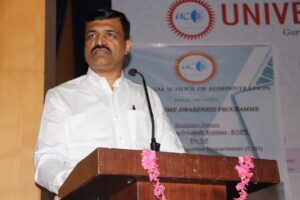
During the interaction session, a sanctified opportunity presented itself, allowing participants to delve deeper into the crux of the matters at hand. This enriching exchange not only elevated the discourse but also fostered a heightened understanding among those present. A moment of profound reverence ensued as Revered Swamiji, the primary petitioner in the Keshavananda Bharati case, was bestowed with accolades, underscoring the significance of his contributions. Furthermore, the gracious gesture of presenting mementos to other dignitaries stood as a poignant symbol of gratitude, resonating with the spirit of appreciation and respect.
Establishment of the “Basic Structure” Doctrine: The Keshavananda Bharati case stands as a cornerstone in the annals of Indian constitutional law, providing the Supreme Court with a fertile ground upon which to establish the foundational doctrine of the “basic structure.” This landmark ruling delineated the contours within which constitutional amendments could operate, safeguarding the core principles of the Constitution from arbitrary alteration.
Impact on Future Jurisprudence: The reverberations of the “basic structure” doctrine echoed far beyond the confines of the courtroom, imprinting its essence onto the tapestry of future jurisprudence. Its influence permeated the fabric of legal discourse, serving as a lodestar for evaluating the constitutionality of amendments, thereby reinforcing the sanctity of constitutional principles.
Democratic Balance and Judicial Authority: While the doctrine bestows upon the judiciary the solemn duty of guarding the foundational tenets of the Constitution, concerns have been raised regarding the potential for an imbalance of power. Critics argue that granting the judiciary the authority to overrule parliamentary will may undermine democratic principles. However, proponents assert that such oversight is necessary to prevent the erosion of constitutional values.
Evolution and Challenges of Interpretation: Over the course of time, the interpretation of the “basic structure” doctrine has undergone a metamorphosis, navigating through the complexities inherent in its open-ended nature. Challenges persist in defining the boundaries of the basic structure, amidst the ever-shifting currents of legal interpretation and societal evolution.
Comparative Analysis with Other Constitutions: The “basic structure” doctrine finds resonance with similar principles enshrined in the constitutions of other nations. While the overarching objective remains the protection of fundamental values, nuances in application and interpretation may vary, reflecting the diverse constitutional landscapes across the globe.
Subjectivity and Democratic Legitimacy: The inherent subjectivity and potential for judicial activism inherent in defining the “basic structure” have sparked debates surrounding its democratic legitimacy. Skeptics caution against the encroachment of an unelected judiciary into the realm of legislative authority, while proponents uphold its role as a bulwark against the tyranny of the majority.
Delineation between Judicial Activism and Overreach: The fine balance struck by the Keshavananda Bharati case between parliamentary sovereignty and judicial supremacy underscores the delicate interplay between judicial activism and overreach. While judicial activism may empower the judiciary to safeguard constitutional values, overreach entails a transgression of its constitutional mandate.
Influence on Public Perception: The profound impact of the Keshavananda Bharati case extends beyond the hallowed halls of the judiciary, permeating into the public consciousness. It has served to bolster public confidence in the judiciary as a guardian of constitutional integrity, fostering a deeper appreciation for its role in upholding the rule of law.
Combatting Corruption and Upholding Independence: While the “basic structure” doctrine may not directly target corruption, its role in upholding the independence of the judiciary serves as a bulwark against malfeasance. By safeguarding the foundational principles of the Constitution, it fortifies the institutional integrity necessary for combatting corruption and upholding the rule of law.
Contribution to Judicial Independence: Within the temporal context, the Keshavananda Bharati case stands as a beacon illuminating the path towards judicial independence. By reaffirming the judiciary’s authority to review constitutional amendments, it reinforces the bedrock upon which the edifice of judicial autonomy is built, thereby fortifying the bastion of democracy.
In the symphony of legal discourse, the echoes of the Keshavananda Bharati case reverberate with resonance, serving as a testament to the enduring legacy of judicial stewardship and constitutional fidelity.
In a celebration of legal acumen and scholarly prowess, the winners of various competitions emerged, each shining brightly in their own right.
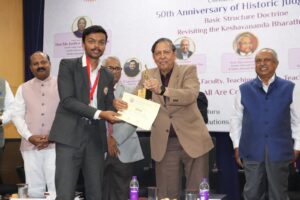
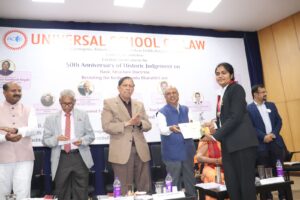
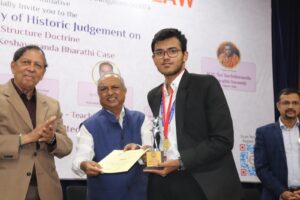
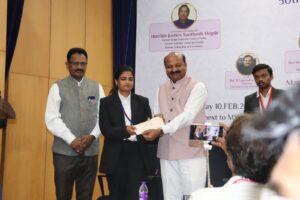
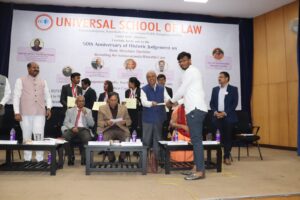
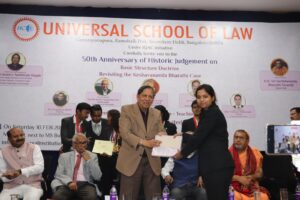
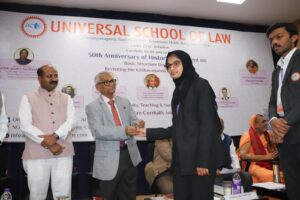
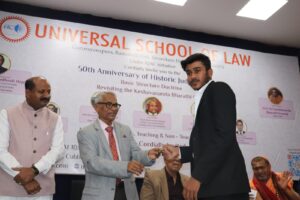
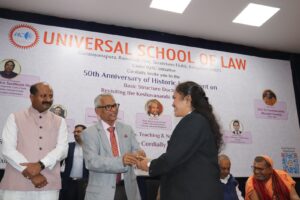
At the State level essay competition hosted by the Universal School Of Law, Lasya of Soundarya Law College claimed the coveted first prize, her words weaving a tapestry of legal insight and intellectual depth. Following closely behind, Sagar Kamley of Universal School Of Administration clinched the second prize, his scholarly endeavors resonating with excellence. Madhumitha of Vidhya Vikasan Law College, with her erudition and finesse, secured the third prize, adding yet another feather to her institution’s cap.
Recognizing the spirit of encouragement and support, Soundarya Law College was hailed as the Best College Representative, its unwavering dedication to nurturing young legal minds and fostering an atmosphere of mentorship applauded by all.
Meanwhile, in the competitive arena of the National Moot Court competition, held in Salem under the aegis of R.V. Dhanapalan, remarkable talents rose to prominence. Pandurang Gireesh, with his eloquence and legal prowess, claimed the distinguished title of First Best Male Speaker, leaving an indelible mark on the audience. Buchupalle Keerthana, with her grace and articulate arguments, was crowned the First Best Female Speaker, her oratory skills leaving the audience spellbound. In the realm of research, Saadia Suraaz was celebrated as the Second Best Researcher, while Akash SH’s scholarly contributions earned him the esteemed title of Best Researcher, a testament to his dedication and diligence.
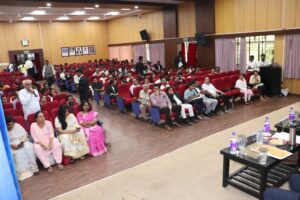
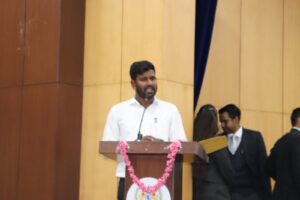
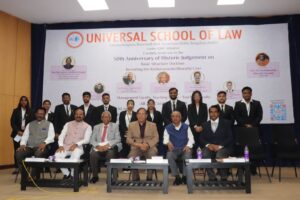
As the event drew to a close, Dr. Gireesh, a distinguished professor of Kannada at the Universal School Of Law, graced the gathering with a heartfelt vote of thanks, acknowledging the collective efforts and achievements of all participants. With hearts brimming with pride and reverence, the gathering joined in unison to sing the National Anthem, a poignant conclusion to a day filled with shared camaraderie and scholarly excellence.
You can also read the news in the below mentioned links :
- http://epaper.samyukthakarnataka.com/articlepage.php?articleid=SMYK_BANG_20240211_03_14
- https://www.prajavani.net/news/karnataka-news/bharat-ratna-to-advani-narasimha-rao-advocate-ravi-varma-kumar-objects-2680141
- https://pragativahini.com/shri-kesavananda-bharati-swamiji-kerala-government-judgment-is-a-landmark-judgement-justice-n-santosh-hegde/
- https://pragativahini.com/shri-kesavananda-bharati-swamiji-kerala-government-judgment-is-a-landmark-judgement-justice-n-santosh-hegde/
- https://youtu.be/FP-eX0G6abE?si=8xqtxadggCEX5bhn
- https://www.vijayavani.net/legislature-has-no-power-to-change-peoples-rights-retired-justice-n-santosh-hegde-abhimata
- https://vistaranews.com/karnataka/the-judgment-in-sri-kesavananda-bharati-vs-government-of-kerala-is-significant-says-santosh-hegde/578493.html
- https://tv9kannada.com/karnataka/bengaluru/kesavananda-bharati-vs-state-of-kerala-supreme-court-order-anniversary-know-details-about-historical-veridict-gsp-779131.html
- https://youtu.be/b_OJ44H826g?si=I408Zy90Ngsdgarj
Article By : Shridhar Bhat

